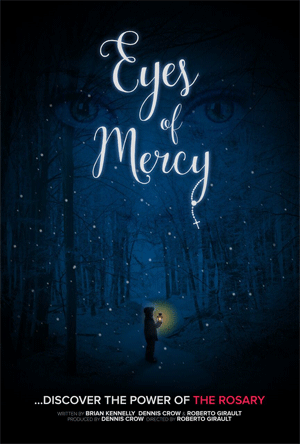 CHARLOTTE — What started as a way for Brian Kennelly to share his thoughts on the Catholic classic "True Devotion to Mary" has turned into a script for a powerful, short film and aspirations of challenging millions of people to pray the rosary.
CHARLOTTE — What started as a way for Brian Kennelly to share his thoughts on the Catholic classic "True Devotion to Mary" has turned into a script for a powerful, short film and aspirations of challenging millions of people to pray the rosary.
Kennelly, a parishioner of St. Ann Church in Charlotte and author of several Catholic novels ("Two Statues," "To the Heights"), has co-written a script and teamed up with Catholic filmmakers in Hollywood to make a short film titled "Eyes of Mercy."
It will take audiences inside the soul of a man struggling through a crisis of faith, and show what happens within his soul when someone prays the rosary for him, Kennelly said.
"Eyes of Mercy" will be put out by the non-profit Vox Dei Productions and will be released for free online so that millions around the world can have easy access to it.
Kennelly read the St. Louis de Montfort book about two years ago, and like many books about faith, he wanted to pass it along to his friends and family. But since it's a "big, heavy book" he wasn't sure that many would read it all the way through.
Instead, he said he created some notes to pass along to his friends. From that he wrote a parable, an allegorical novella entitled "The Parable of the Lady in Blue: A Tale of Marian Apology," then turned that into an audio drama. After meeting a Catholic movie director, Kennelly said, he sent him the audio drama.
"From there, it spiraled out of control in a good way," he said. "We hope that this film will be unlike anything anyone's ever seen in the faith-based market."
Kennelly has teamed up with fellow Catholic filmmakers Dennis Crow, Roberto Girault and Paul Hertel. The film will have a unique style, with little dialogue and a powerful musical score, to appeal to a global audience. The script has also changed a bit from his parable.
"It will be a very mystical film that shows us how God's grace comes to us through Mary – it will give a very powerful visual to something that is otherwise unseen by our eyes," Kennelly said.
The character is seen as a young child traveling through a dark, wintry forest. With only the light from his virtues to protect him, the child is hunted by ravenous wolves.
There is a spiritual battle at play within each of us, and through this film millions of people will see this battle in a whole new light and be reminded of how God sees us as one of His children, he said. They will discover the power of the rosary and the effect it has on the people who pray it, and those for whom they pray.
"The film brings the viewer into a 'mystical reality.' People will actually see what happens within a lost soul when someone prays the rosary for him," said Girault, the director. "With state-of-the-art CGI and an international cast, we are presenting a quality, faith-affirming film that will challenge and inspire the audience."
But in order to produce the movie, they need to raise about $300,000. So they have launched a Kickstarter campaign and are searching for small donations. After about a week, the project has raised more than $50,000 with donations from all over the world.
The project is dependent on a grassroots campaign and use of social media, for awareness as well as fundraising. A short promotional video on their Facebook page has already been viewed more than 240,000 times in just the first week.
"We want this to be an apostolic thing that people can use to evangelize," Kennelly said.
"We want millions of people around the world to have easy access to it. But in order to take this route, and not go through a studio and eventually have DVD sales, we need the people to help get it done. It's tough to get films like this made in Hollywood... we need the help of good Catholics," he said.
Kennelly said he hopes people in his home diocese can provide a starting point for helping generate the funds needed for production. The online fundraising campaign runs through Aug. 4.
If the fundraising campaign is successful, Kennelly said, they hope to start filming in October and release the movie on Jan. 1, the Solemnity of Mary, Mother of God.
— Kimberly Bender, online reporter
How you can help
To donate to the making of "Eyes of Mercy," click here.
You can also e-mail Brian Kennelly at This email address is being protected from spambots. You need JavaScript enabled to view it..
Go to Facebook and search "Eyes of Mercy" to see a short video and learn more.
 GREENSBORO — A high school chorale in Greensboro is headed to Rome this summer for a once-in-a-lifetime experience: singing at the Festival Corale Internazionale Di Roma, an invitation-only event and one of the premiere musical events held in Rome each year.
GREENSBORO — A high school chorale in Greensboro is headed to Rome this summer for a once-in-a-lifetime experience: singing at the Festival Corale Internazionale Di Roma, an invitation-only event and one of the premiere musical events held in Rome each year.
Chorale students from the Weaver Academy for Performing and Visual Arts and Advanced Technology, a magnet school in Greensboro, will perform during a Solemn Mass at St. Peter's Basilica in the Vatican and in a full concert at the Basilica di Sante Maria sopra Minerva.
For these students, the upcoming performances in Rome follow a series of other notable performances over the past year that include singing in the National Youth Choir at Carnegie Hall in New York City and performing as the feature solo choir to open the Spring 2015 National Youth Choir performance at Carnegie Hall.
Pictured: Olivia Moore, Trevor Neal and Tyler Wall performed solo vocals during the Weaver Chorale's fall concert featuring Franz Schubert's "Mass in G" (Mass No. 2 in G major, D 167). The choir from the Greensboro magnet school will perform in Rome this summer. (Annette Tenny, Catholic News Herald)Chorale director Donna Brotherton said the Carnegie Hall performances may have caught the eye of the Rome festival organizers, who sent her an invitation via email "out of the blue."
"Someone in the chorale conducting world had heard us, perhaps at a competition or at Carnegie Hall," she said. "It's a small world and word gets out about a choir."
The Weaver Chorale will join choirs and mixed voice groups from all over North America under the direction of maestro Z. Randall Stroope, an internationally known composer and conductor whose works are performed all over the world.
"I've been performing his pieces for years with my choirs," said Brotherton. To have the opportunity to sing under the direction of someone as renowned as Stroope is rare for a high school group, she added.
The Weaver Chorale group will perform as part of a larger choir, and the singers will have only three rehearsals before the late afternoon Mass at St. Peter's. They will have one dress rehearsal before the Festival Finale concert at the Basilica di Sante Maria sopra Minerva.
"I think the most difficult thing about this trip will be learning how to blend with the other singers – people with different accents, different languages, different cultures," noted Alexandra Little, who sings alto. "We only really have a few hours to rehearse with them."
The Weaver Chorale is beginning rehearsals this month, and in March they plan to have a public concert previewing the entire repertoire they will sing in Rome.
Though the magnet school is small, graduating around 60 or so students each year, it aims to give students exceptional experiences at more than a high school level. Students are challenged musically and the academics are as rigorous as the training in the arts.
"The kids have to do a lot to get into Weaver, write an essay, audition – but their hard work has obvious results," said Deborah Little, Alexandra's mother.
"We have been blessed with exceptional opportunities here at Weaver Academy," Brotherton said. "The level of talent here is amazing. We are very excited at the opportunity to sing in the Vatican."
— Annette K. Tenny, correspondent

